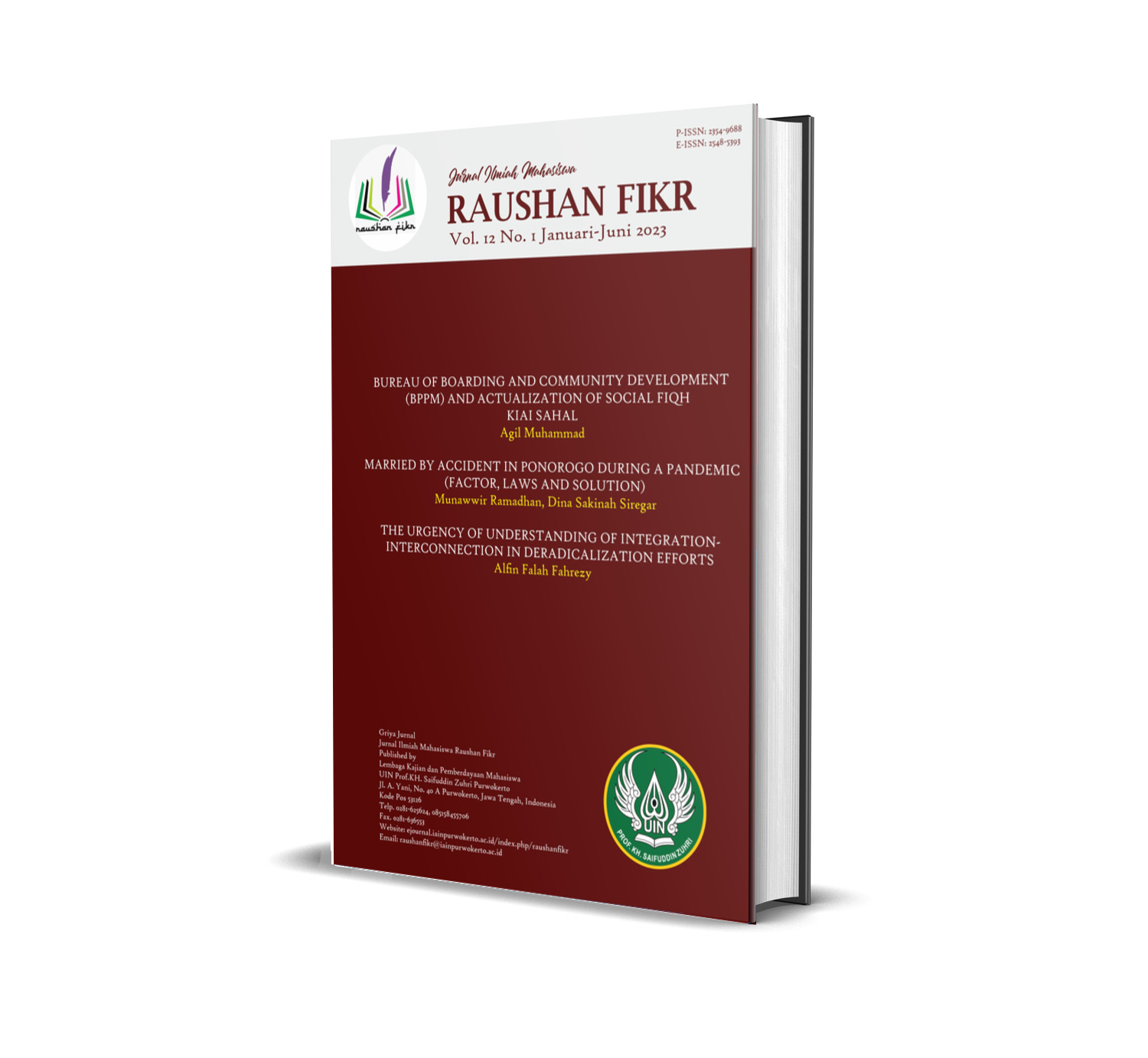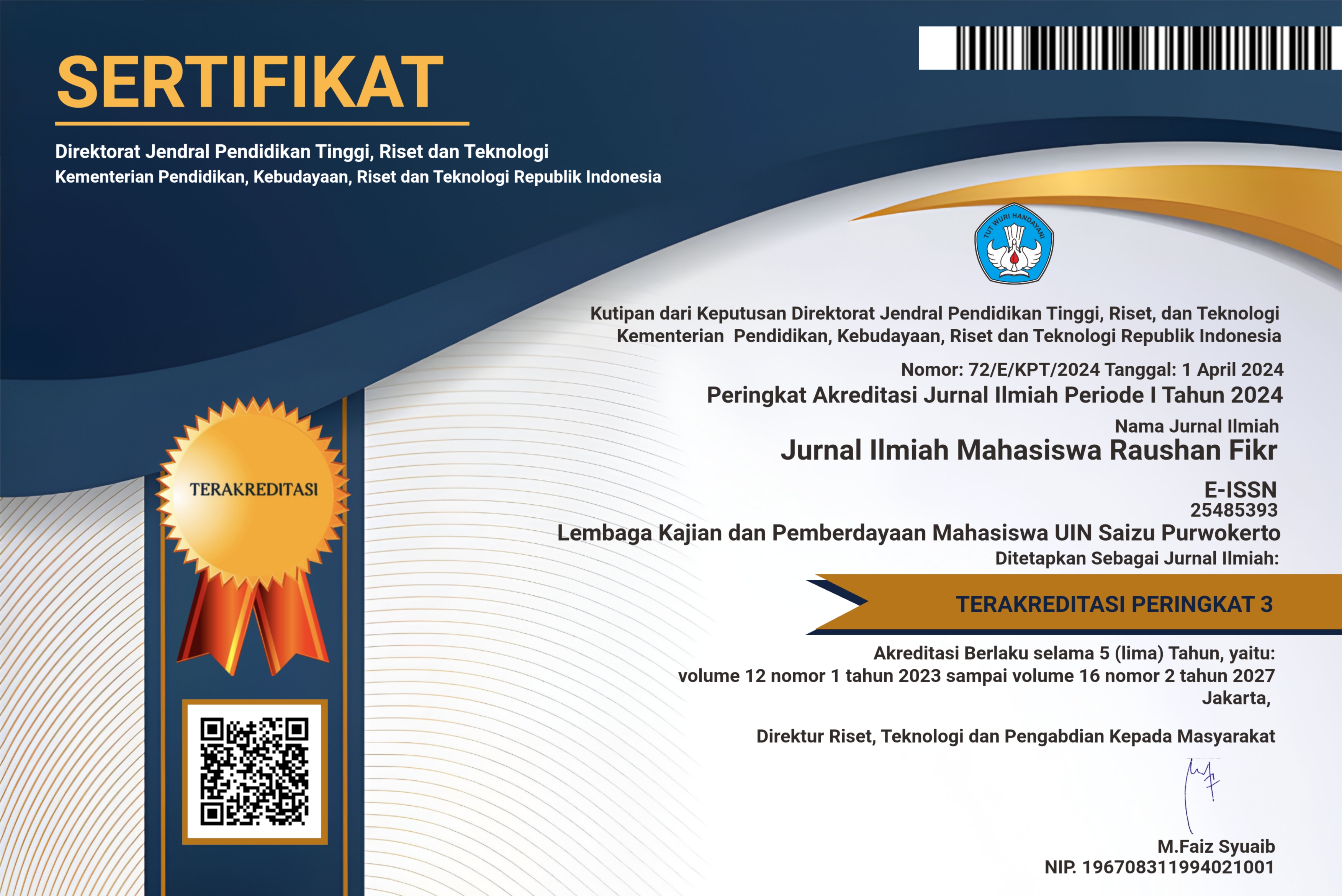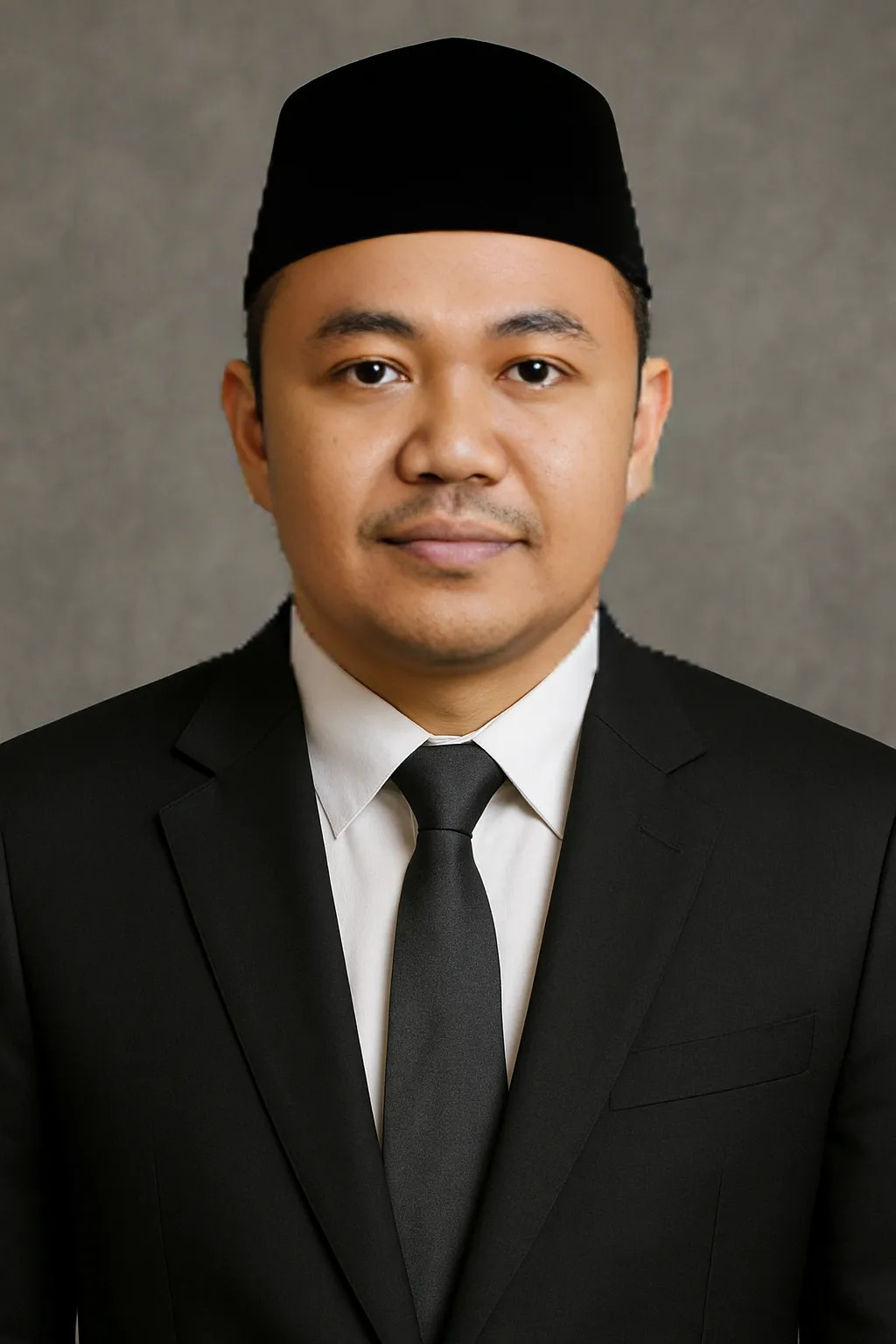The Urgency of Understanding Integration-Interconnection in Deradicalization Efforts
DOI:
https://doi.org/10.24090/jimrf.v12i1.6088Keywords:
Radicalism, Deradicalization, Integration-interconnectionAbstract
This article attempts to dissect the roots of radicalism in Indonesia by using Amin Abdullah’s integration-interconnection analysis, which aims to formulate alternative solutions to deradicalization efforts. Judging from the phenomenon of radicalism so far, one-sided truth claims are one of the main causes of radicalism in addition to other factors such as economic and social. One-sided truth claims narrow the view in understanding religion and social reality. Moreover, the notion of radicalism also spreads in educational institutions and correctional institutions, which should be ideal places for deradicalization efforts. An integrative and interconnected paradigm directs a holistic mindset by paying attention to all fields of knowledge to help prevent partial and narrow product thinking. From this research, the integration-interconnection paradigm initiated by Amin Abdullah can be an ideal epistemological basis for preventing radicalism. Therefore, it becomes important to implement the integration-interconnection paradigm in the curriculum, both in educational and correctional institutionsDownloads
References
Abdullah, M. A. (2012). Islamic Studies di Perguruan Tinggi Pendekatan Integratif-Interkonektif (3rd ed.; M. A. Abdushomad, Ed.). Yogyakarta: Pustaka Pelajar.
Abdullah, M. A. (2020). Dinamika Islam Kultural. In E. A. Iyubenu & Rusdianto (Eds.), Dinamika Islam Kultural (1st ed., p. 96). Yogyakarta: IRCiSoD.
Adrian, & C, M. P. B. (2021). Analisis Aksi Lone Wolf Terrorism: Penangkapan Abu Arkam di Kabupaten Berau. Jurnal Pena Wimaya, 1(1), 6. Retrieved from http://www.jurnal.upnyk.ac.id/index.php/jpw/article/view/4636
Arifin, S., & Bachtiar, H. (2013). Deradikalisasi Ideologi Gerakan Islam Transnasional Radikal. Harmoni, 12(1), 21. https://doi.org/10.24252/vp.v1i1.8099
Asrori, S. (2019). Prisonisasi dan Penyebaran Ideologi Radikal. Mimbar Agama Budaya, 36(1), 39–56. https://doi.org/10.15408/mimbar.v36i1.13184
Chaidar, A., Sahrasad, H., Zulkarnaen, I., & Rahman, F. A. (2019). PROGRAM HUMANISASI : Refleksi tentang Rehabilitasi Pelaku dan Korban Terorisme untuk Konteks Indonesia. 3(1), 1–20.
Dewantara, A. W. (2019). Radikalisme Dalam Konteks Indonesia Yang Agamis Dan Berpancasila. JPAK: Jurnal Pendidikan Agama Katolik, 19(1), 1–14. https://doi.org/https://doi.org/10.34150/jpak.v19i1.222
Fahmi, I. R., & Rohman, M. A. A. (2021). Non-Dikotomi Ilmu: Integrasi-Interkoneksi Dalam Pendidikan Islam. Al-MIKRAJ: Jurnal Studi Islam Dan Humaniora, 1(2), 46–60. Retrieved from https://ejournal.insuriponorogo.ac.id/index.php/almikraj/article/view/750
Febriyansah, M. N., Khodriah, L., & Kusuma, R. (2017). Upaya Deradikalisasi Narapidana Terorisme di Lembaga Pemasyarakatan ( Lapas ) Kedung Pane Semarang. Jurnal Unnes, Vol.3(1), 91–108.
Ghifari, I. F. (2017). Radikalisme di Internet. Religious: Jurnal Studi Agama-Agama Dan Lintas Budaya, 1(2), 123. https://doi.org/10.15575/rjsalb.v1i2.1391
Hafid, W. (2020). Geneologi Radikalisme Di Indonesia (Melacak Akar Sejarah Gerakan Radikal). Journal of Islamic Law, Fakultas Agama Islam UMI, 1(1), 31–46. https://doi.org/http://dx.doi.org/10.33096/altafaqquh.v1i1.37
Huda, A. Z. (2019). Melawan Radikalisme Melalui Kontra Narasi Online. Journal of Terrorism Studies, 1(2), 1–15. https://doi.org/10.7454/jts.v1i2.1007
Husein, M. T. (2017). Fenomena Radikalisme Di Indonesia. Rausyan Fikr, 13(2).
Iskandar, & Cipto, T. (2022). Upaya Pemberantasan Islam Radikalisme dan Pendanaan Terorisme di Indonesia. Khazanah Multidisiplin, 3(2), 117–138. https://doi.org/10.15575/kl.v3i2.17132
Isnanto, S. H. (2018). Berbagai Masalah Dan Tantangan Radikalisasi Dan Deradikalisasi Terorisme Di Indonesia. Jurnal Pertahanan & Bela Negara, 5(2), 225–244. https://doi.org/10.33172/jpbh.v5i2.366
Jafar, T. F., Sudirman, A., & Rifawan, A. (2019). Ketahanan Nasional Menghadapi Ancaman Lone Wolf Terrorism Di Jawa Barat. Jurnal Ketahanan Nasional, 25(1), 73. https://doi.org/10.22146/jkn.41244
Khamdan, M. (2015). Rethinking Deradikalisasi: Konstruksi Bina Damai Penanganan Terorisme. Addin, 9(1), 181–204. https://doi.org/http://dx.doi.org/10.21043/addin.v9i1.612
Kriswanto, J. (2018). Serangan bom di tiga gereja Surabaya: Pelaku bom bunuh diri “perempuan yang membawa dua anak.” Retrieved December 24, 2021, from bbc.com website: https://www.bbc.com/indonesia/indonesia-44097913
Labaso, S. (2018). Paradigma Integrasi-Interkoneksi Di Tengah Kompleksitas Problem Kemanusiaan. Al-A’raf : Jurnal Pemikiran Islam Dan Filsafat, 15(2), 335. https://doi.org/10.22515/ajpif.v15i2.1462
Mufid, F. (2016). Radikalisme Islam dalam Perspektif Epistemologi. ADDIN, 10(1), 61–82. https://doi.org/10.30603/au.v16i2.159
Munip, A. (2017). Buku Jihad Terjemahan dari Bahasa Arab dan Potensi Radikalisme Beragama di Lembaga Pendidikan. Cendekia: Jurnal Pendidikan Dan Kemasyarakatan, 15(2), 175–196. https://doi.org/https://doi.org/10.21154/cendekia.v15i2.1080
Muthohirin, N. (2015). Radikalisme Islam dan Pergerakannya di Media Sosial. Afkaruna, 11(2), 240–259. https://doi.org/10.18196/aiijis.2015.0050.240-259
Qodir, Z. (2013). Deradikalisasi Islam dalam Perspektif Pendidikan Agama. 2(1), 85–107. https://doi.org/10.14421/jpi.2013.21.85-107
Rambe, U. K. (2019). Pemikiran Amin Abdullah. Al-Hikmah: Jurnal Theosofi Dan Peradaban Islam, 1(2). https://doi.org/10.51900/alhikmah.v1i2.4850
Ro’uf, A. M. (2007). Mengurai Radikalisme Agama di Indonesia Pasca Orde Baru. Ulumuna, 11(1), 161.
Rois, A. (2013). PENDIDIKAN ISLAM MULTIKULTURAL: Telaah Pemikiran Muhammad Amin Abdullah. Epistemé: Jurnal Pengembangan Ilmu Keislaman, 8(2), 301–322. https://doi.org/10.21274/epis.2013.8.2.301-322
Rosidah, N. (2012). Fundamentalisme Agama. Walisongo, 20(1), 1–24. Retrieved from http://eprints.walisongo.ac.id/1929/1/Nur_Rosidah-Fundamentalisme_Agama.pdf
Ruslan, I. (2017). ISLAM DAN RADIKALISME: Upaya Antisipasi dan Penanggulangannya. Kalam, 9(2), 215. https://doi.org/10.24042/klm.v9i2.329
Saladin, B. (2018). Jihad Dan Radikalisme Menurut Quraish Sihab Dan Sayyid Quthb. NUANSA: Jurnal Penelitian Ilmu Sosial Dan Keagamaan Islam, 15(2), 439. https://doi.org/10.19105/nuansa.v15i2.2066
Siregar, P. (2014). Integrasi Ilmu-Ilmu Keislaman Dalam Perspektif M. Amin Abdullah. MIQOT: Jurnal Ilmu-Ilmu Keislaman, 38(2), 335–354. Retrieved from http://jurnalmiqotojs.uinsu.ac.id/index.php/jurnalmiqot/article/view/66
Sugilar, H., Rachmawati, T. K., & Nuraida, I. (2019). Integrasi interkoneksi matematika agama dan budaya. Jurnal Analisa, 5(2), 189–198. https://doi.org/10.15575/ja.v5i2.6717
Suryadilaga, M. A. (2020). Pemahaman Hadis Tentang Covid-19 dalam Perspektif Integrasi-Interkoneksi Amin Abdullah. Khazanah: Jurnal Studi Islam Dan Humaniora, 18(2), 173–196. https://doi.org/http://dx.doi.org/10.18592/khazanah.v18i2.3795
Taher, A. P. (2022). Amin Abdullah Gantikan Almarhum Syafii Maarif di BPIP. Retrieved June 17, 2022, from tirto.id website: https://tirto.id/amin-abdullah-gantikan-almarhum-syafii-maarif-di-bpip-gsGh
Tajuddin, T., & Awwaliyah, N. M. (2021). Paradigma Integrasi-Interkoneksi Islamisasi Ilmu Dalam Pandangan Amin Abdullah. Aksiologi : Jurnal Pendidikan Dan Ilmu Sosial, 1(2), 56–61. https://doi.org/10.47134/aksiologi.v1i2.11
Taufik Akbar, Pujo Widodo, S. A. (2020). Strategi Pemerintah Dalam Menghadapi Ancaman Returnees Foreign Fighter Di Indonesia Government’s Strategy in Facing the Threats of Returnees Foreign Fighters in Indonesia. Jurnal Peperangan Asimetris Universitas Pertahanan, 6(1), 220–246.
Teja, M. (2011). Hilangnya Hak Anak: Studi Kasus Jamaah Ahmadiyah Indonesia. Aspirasi: Jurnal Masalah-Masalah Sosial, 2(2), 191–208.
Umar, A. R. M. (2010). Melacak Akar Radikalisme Islam di Indonesia. Jurnal Ilmu Sosial Dan Ilmu Politik, 14(2), 169–186. https://doi.org/10.1158/1541-7786.MCR-07-0324
Ummah, S. C. (2012). Akar Radikalisme Islam di Indonesia. Humanika, 12(12), 112–124. Retrieved from https://journal.uny.ac.id/index.php/humanika/article/view/3657
Yulanda, A. (2020). Epistemologi Keilmuan Integratif-Interkonektif M. Amin Abdullah Dan Implementasinya Dalam Keilmuan Islam. TAJDID: Jurnal Ilmu Ushuluddin, 18(1), 79–104. https://doi.org/10.30631/tjd.v18i1.87
Zada, K. (2015). Radikalisme Dalam Paham Keagamaan Guru Dan Mata Pelajaran Fikih Di Madrasah Aliyah. Penamas; Jurnal Penelitian Keagamaan Dan Kemasyarakatan, 28(1), 1–20.
Zamzamy, A. (2019). Menyoal Radikalisme Di Media Digital. Dakwatuna: Jurnal Dakwah Dan Komunikasi Islam, 5(1), 13. https://doi.org/10.36835/dakwatuna.v5i1.318
Zuhdi, M. H. (2010). Fundamentalisme Dan Upaya Deradikalisasi Pemahaman Al-Qur’an Dan Hadis. Religia, 13(1), 81–102.
Downloads
Published
How to Cite
Issue
Section
License
Copyright (c) 2023 Alfin Falah Fahrezy

This work is licensed under a Creative Commons Attribution-NonCommercial-ShareAlike 4.0 International License.
Authors who publish with this journal agree to the following terms:
- Authors retain copyright and grant the journal right of first publication with the work simultaneously licensed under a Creative Commons Attribution-NonCommercial-ShareAlike 4.0 International License that allows others to share the work with an acknowledgement of the work's authorship and initial publication in this journal.
- Authors are able to enter into separate, additional contractual arrangements for the non-exclusive distribution of the journal's published version of the work (e.g., post it to an institutional repository or publish it in a book), with an acknowledgement of its initial publication in this journal.
- Authors are permitted and encouraged to post their work online (e.g., in institutional repositories or on their website) prior to and during the submission process, as it can lead to productive exchanges, as well as earlier and greater citation of published work (See The Effect of Open Access).
















